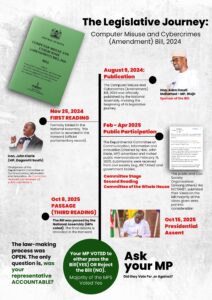Blow to Govt as Court Suspends Parts of the Computer Misuse and Cybercrimes Act
Share
The government has suffered a major setback after the High Court temporarily suspended the enforcement of key provisions of the Computer Misuse and Cybercrimes (Amendment) Act, 2025.
Justice Lawrence Mugambi issued the conservatory orders on Wednesday, halting the implementation of Sections 27(1)(b), (c), and (2) of the new law pending the determination of a petition filed by politician Reuben Kigame and the Kenya Human Rights Commission (KHRC).
“I have read the Notice of Motion application dated 21/10/2025, the certificate of urgency of even date, together with the affidavit in support sworn by Dr. Reuben Kigame Lichete and direct that pending the hearing and determination of this application, a conservatory order is hereby issued suspending the enforcement, implementation and operation of Section 27(1)(b), (c) and (2) of the Computer Misuse and Cybercrimes (Amendment) Act, 2025,” Justice Mugambi ruled.
The judge directed that the application and submissions be served physically within three days and that responses be filed within seven days from the date of service.
He further allowed the petitioners to file a rejoinder within seven days after receiving the responses.
The matter will be mentioned for further directions on November 5, 2025.
Also Read: NCIC Denies Summoning Mutahi Kahiga
Rights Groups Challenge the Law’s Legality
The court’s intervention follows public uproar over the newly signed law, which President William Ruto assented to on October 15, 2025.
Petitioners argue that the amendments threaten freedom of expression, privacy, and media independence as enshrined in the Constitution.
Kigame, a former presidential aspirant and human rights advocate, said the provisions risk turning Kenya into a surveillance state.
The KHRC warned that the amendments could be used to stifle dissent and criminalize legitimate online discourse.
“The government cannot claim to promote democracy while passing laws that silence criticism,” the KHRC stated.
Digital rights groups and media advocates have since welcomed the court’s decision, describing it as a win for constitutional freedoms and democratic accountability.
Legislative Path from Publication to Passage
Kenya’s legislative process, often faulted for opacity and political influence, came under fresh scrutiny following the passage of the Computer Misuse and Cybercrimes (Amendment) Bill 2024, the same law now facing a constitutional challenge.
The Bill was first published on August 9, 2024, in the National Assembly, sponsored by Aden Daudi Mohamed, the MP for Wajir, who argued that the amendments were meant to address new cyber threats in Kenya’s fast-growing digital economy.
The Bill proceeded to its First Reading on November 25, 2024, before being referred to the Departmental Committee on Communication, Information and Innovation, chaired by John Kiarie (MP, Dagoretti South).
Public Participation and Civil Society Pushback
As required by Article 118 of the Constitution, the Bill underwent public participation between February and April 2025.
Citizens, civil society groups, and professional bodies, including KICTANet and the Law Society of Kenya, submitted written and oral memoranda.
The committee compiled all submissions and presented a detailed report during the Second Reading, leading to a clause-by-clause debate at the Committee of the Whole House stage.
Also Read: Court Issues New Directives on National Police Recruitment
Final Passage and Presidential Assent
On October 8, 2025, the Bill proceeded to its Third Reading, where the majority of MPs voted in favor.
The vote was followed by an official infographic from Parliament declaring the process transparent, with a reminder: “The law-making process was open. The only question is, was your representative accountable?”
Afterward, the Bill was sent to President William Ruto, who assented to it on October 15, 2025, turning it into law.
However, the move triggered public backlash and legal petitions, with activists accusing the government of attempting to restrict online dissent.
Public Debate and Ongoing Court Battle
The enactment reignited national debate on the balance between cybersecurity and freedom of expression.
Supporters argue the law is necessary to combat rising cyber threats, including fraud, misinformation, and hate speech.
Opponents, however, insist that it grants the government sweeping powers to monitor and prosecute online activity.
With the High Court’s suspension of key sections, the law’s future now depends on upcoming judicial proceedings, a case that could set a precedent for digital rights protection in Kenya’s evolving online landscape.

Kenya’s legislative process for the Computer Misuse and Cybercrimes (Amendment) Bill, 2024. PHOTO/ Parliament of Kenya.
